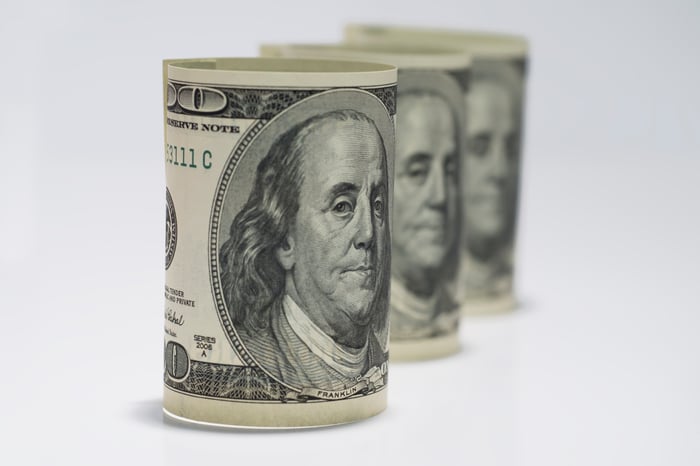Despite the shortened hours, Friday, Nov. 26 represented a bumpy ride for investors. All three of the major indexes shed between 2.2% and 2.5% of their value as a new coronavirus variant of concern, labeled as omicron, emerged in South Africa.
While big down moves in the broader market can be unnerving in the very short run, they've always represented an opportunity for long-term investors to buy great companies at a discount. Best of all, with most online brokerages eliminating minimum deposit requirements and commission fees, any amount of money -- even $300 -- can allow investors to snag great companies on the cheap.
If you have $300 ready to put to work in the market, the following four no-brainer stocks can be confidently bought right now.

Image source: Getty Images.
Visa
Next to death and taxes, life's third certainty has been to buy payment-processing stocks on any weakness. Given the rise of cryptocurrencies and Square's pending acquisition of Afterpay, the opportunity is ripe to take advantage of unfounded concerns and nab shares of Visa (V 0.49%) at a discount.
The beauty of Visa's operating model is it's tied at the hip to the U.S. and global economy. Even though it's susceptible for weaker fee generation when recessions strike, periods of economic instability are often measured in months. By comparison, economic expansions last for years. Buying Visa allows patient investors to take advantage of a simple numbers game. As the U.S. and global economy grow, so will Visa's revenue and profit potential.
Visa also offers multi-decade growth potential. Since most global transactions are still being conducted in cash, and many regions of the world remain underbanked, Visa has an opportunity to expand its infrastructure to new regions for a long time to come.
Additionally, you'll note that Visa avoids lending. Though it could generate interest income during long periods of economic expansion, it would also be exposed to credit/loan delinquencies when inevitable economic contractions strike. Since it doesn't lend, no capital needs to be put aside to cover losses. This conservative approach is what helps buoy its profit margin above 50%.

Image source: Getty Images.
Walgreens Boots Alliance
Generally, healthcare stocks are (pardon the pun) immune to economic downdrafts. Since people can't control when they get sick, demand for drugs, devices, and healthcare services doesn't change much. But this wasn't the case for pharmacy chain Walgreens Boots Alliance (WBA -0.06%), which was clobbered by the coronavirus disease 2019 (COVID-19) pandemic and reduced foot traffic to its stores. The good news for investors is that they can buy into this no-brainer turnaround story at an attractive price (9 times Wall Street's forward-year earnings forecast).
Walgreens is in the midst of a multipoint strategy designed to boost margins and increase grassroots engagement. As you might imagine, reducing unnecessary costs is part of the plan. Although management was aiming for $2 billion in annual operating-cost reductions by the end of fiscal 2022, Walgreens surpassed $2 billion in annual savings a full year earlier than expected.
Here's the thing: Even with a mindful eye on cost reduction, no expenses are being spared when it comes to spending on digitization. There's little question that Walgreens' brick-and-mortar locations will remain its primary sales driver. However, with a revamped online presence and online order pickup options, the company has a means to rapidly grow sales based on convenience.
But the most exciting thing about this company might just be its partnership with privately held VillageMD. The duo plan to open more than 600 full-service clinics co-located at Walgreens by 2025, and reach 1,000 locations by 2027. Whereas most clinics handle nothing more than vaccines and a sniffle, the Walgreens/VillageMD clinics will be physician-staffed and act as a repeat business funnel for Walgreens' high-margin pharmacy.

Image source: Getty Images.
Ping Identity
Another no-brainer stock investors can scoop up right now with $300 is cybersecurity company Ping Identity (PING).
The great thing about cybersecurity is it's evolved into a basic need service. No matter how big or small a business, or how well or poorly the U.S. and global economy are performing, robots and hackers don't take a day off from trying to steal enterprise and customer data. With more businesses than ever creating an online presence and shifting data into the cloud in a remote work-driven world, it's third-party solutions providers like Ping Identity that are increasingly relied on.
True to its name, Ping prides itself on identity verification solutions. More specifically, its solutions lean on artificial intelligence to grow smarter and more effective at identifying and responding to threats over time. The PingOne Cloud Platform works hand-in-hand with on-premises solutions to verify, authenticate, and continuously monitor users.
The most exciting development for the company is the steady shift we're witnessing away from term-based subscription licenses to software-as-a-service (SaaS)-based subscriptions. The latter offers steadier cash flow, a stronger likelihood of customer retention, and should lift the company's already juicy subscription margin of 84%.

Image source: Getty Images.
Novavax
Lastly, long before omicron became a COVID-19 variant of interest, biotech stock Novavax (NVAX -2.51%) had the makings of a no-brainer buy.
The Novavax name might be familiar with a lot of folks because it's expected to be a key player in fighting COVID-19. The company's vaccine candidate, NVX-CoV2373, was examined in two large-scale studies this year and produced respective vaccine efficacies of 89.7% in the U.K. and 90.4% in the U.S. and Mexico. While there's more to a COVID-19 vaccine's success than just its initial efficacy, the data looks strong enough to unseat a few other vaccines with less impressive initial efficacy.
The only reason Novavax's share price hasn't ascended to the heavens is because it had some short-term operating challenges. Multiple emergency-use authorization (EUA) filings were delayed, and there were concerns about vaccine production ramp-up and quality. The good news is these concerns are being put in the rearview mirror. Novavax's vaccine has already been given the green light in Indonesia and the Philippines, and it's filed a multitude of EUA or interim authorizations, including with the World Health Organization, the U.K. Canada, and Australia, to name a few.
What's more, the company can further differentiate itself with combination vaccines targeting COVID-19 and influenza. With a drug development platform designed for quick turnaround, Novavax could become one of the growth stories of the decade.





